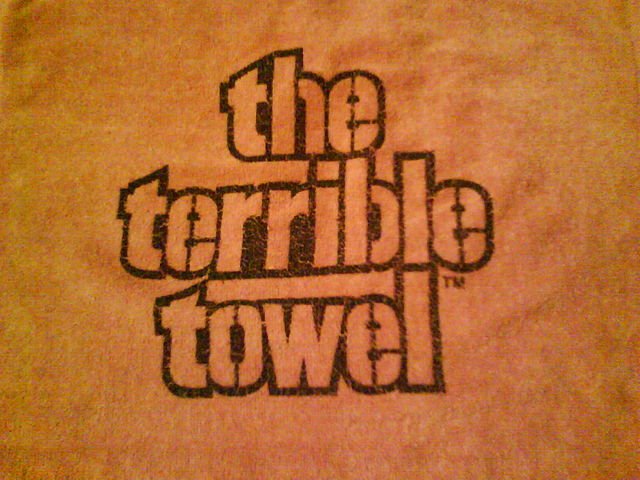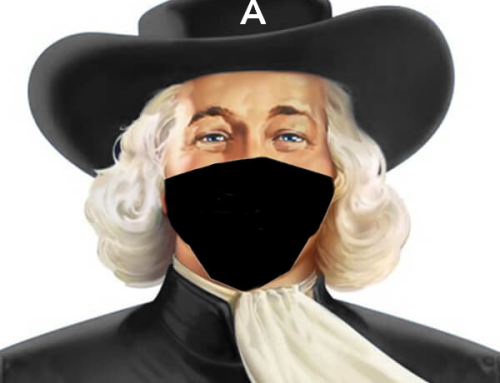We love it because it’s authentic, not handed out by some bank or corporation — a giveaway fit for nothing greater than cleaning the car. Cope’s Towel is bigger than that. It is a part of our history and Pittsburghers love nothing more than hometown history.
By Jody DiPerna
On Sunday, Donald Trump staged a photo-op where he served supporters at a McDonald’s in Bucks County, on the eastern end of Pennsylvania. That night, he came across the Commonwealth to Pittsburgh to watch some of the football game between the Steelers and the New York Jets.
For football fans, if you’ve seen a single Steelers game in your life, whether home or on the road, you know that the yellow towels get going at some point. They are hard to miss, which is really the point. Seems as though someone on team Trump saw them, too, and thought it was a good idea to rip them off. Trump Towels replace the “Terrible” with “Trump,” which is apropos enough. That said, the official Terrible Towel was trademarked by its inventor, Myron Cope.
For many years, Myron Cope was a sports journalist, a sports writer, specifically. By the 1970s, he parlayed his brilliant writing into radio and television gigs. He became the color man on Steelers radio broadcasts. He had a call-in sports talk show, where he would often take a call by saying, “Ya got Cope, what’s on your noodle?”
Simultaneously and serendipitously, after decades of being historically bad, the Steelers were on the verge of becoming historically great. Cope was there for it all.
In 1975, heading into a home playoff game against the Baltimore Colts, Cope’s bosses wanted him to come up with a gimmick. He said, in his 2002 memoir, “Double Yoi,” that he told his bosses he wasn’t “a gimmick guy.” They were insistent, so he thought on it.
What he was after was something inexpensive, easy to access, lightweight — a towel. He exhorted the fans on radio and television to bring yellow towels to the playoff game.
Thus, a new flag was born.
Like many Pittsburghers, my first Terrible Towel was a handmade one — just a yellow towel on which “Steelers” had been written with a marker or something.
As the Towel took off, it became ubiquitous at Steelers games. By 1978, the year the Steelers became the first franchise in NFL history to win three Super Bowls, the players had fully adopted the Towel. Legendary receivers Lynn Swann and John Stallworth came out before a game waving the Towel.
Cope wisely trademarked the Terrible Towel — “Myron Cope’s Official Terrible Towel.” The proceeds didn’t benefit Cope himself, but rather went to the Merakey Allegheny Valley School. Merakey AVS provides homes and a full range of services to individuals with all levels of intellectual and developmental disabilities. (To be nitpicky, Cope assigned all rights to the Towel to the Steelers and the Steelers, in turn, pay all royalties to Merakey AVS.)
This was an important cause for Cope. If I buy an official Towel as a present or to replace my old one because I tend to mislay these things, I always feel pretty good about it for that reason.
It is unacceptable for anybody to rip off the Towel, but people do. However, for Donald Trump to do it — a man who viciously made fun of New York Times reporter, Sergei Kovaleski’s disability (Kovaleski has arthrogryposis, a condition that affects the movement of joints and is noticeable in his right arm and hand) —is grotesque. That this particular politician would ignore the trademark which benefits this specific nonprofit, one that cares for people with intellectual and developmental disabilities, is just another in a long line of truly disgraceful acts.
In a campaign visit presumably meant to woo Western Pennsylvania voters, it shows a serious misunderstanding of the sacred nature of the Towel. We love it because it’s authentic, not handed out by some bank or corporation — a giveaway fit for nothing greater than cleaning the car. Cope’s Towel is bigger than that. It is a part of our history and Pittsburghers love nothing more than hometown history.
Though I now have very mixed feelings about the sport of football broadly and the National Football League specifically, I still cherish the Towel. It stands for helping your neighbor because instead of profiting, Cope ensured that the Towel would forever do some good. A man or a corporation or even the team itself does not profit from the Towel — it does good in the community, in our community.
The Legend of the Towel
Originally intended for playoff use only, Steelers fans started bringing the Towel to regular season games, too. They took them on the road. For people from any one of the other 31 NFL cities, I’m sorry. I realize that a few thousand loud, obnoxious, yellow towel-waving Pittsburgh fans descending on your fair hamlet like so many unwashed Visigoths is probably nauseating. I get it. But the Towel itself must be respected.
Often, heading into a big playoff game, I remember Cope saying that the Towel “was poised to strike” in that inimitable Pittsburgh but uniquely Cope way, and him talking about the Towel’s mysterious powers. He wasn’t wrong. Teams that have disrespected the Terrible Towel often found their seasons end ignominiously.
In 2005, Cincinnati receiver T.J. Houshmandzadeh used the Towel as a floor mat and cleaned his shoes with it after the Bengals beat the Steelers at Heinz Field. That Bengals team lost about a month later to the Steelers in the playoffs. The Bengals went home. Again. The Steelers headed to the Super Bowl. Again.
In December, 2008, the Steelers rolled into Nashville to play the 13-2 Tennessee Titans, a team favored to reach the Super Bowl as the AFC representative. The Titans won that game, then Jevon Kearse blew his nose into a Terrible Towel. Linebacker Keith Bullock spit on and kicked it. Running back LenDale White stomped on it. Tennessee lost their next two games and then lost to the Ravens in the first round of the playoffs. It was another 11 seasons before the Titans made it back to the playoffs. The Steelers, on the other hand, made it back to the Super Bowl and won against the Arizona Cardinals.
What I’m saying is, I don’t really believe in supernatural powers, curses, karma, haints or the Easter Bunny. And I do believe the Towel is generally a positive force. That said, if you upset it, well, I don’t know what kind of fury from the gods you will unleash.
The day after the Steelers victory, the day after Trump’s publicity photo op at McDonald’s, the stock of the venerable company dropped. The day after that, on October 22nd, the Centers for Disease Control reported e-coli linked to Quarter Pounders from McDonald’s restaurants across 10 different states, with one death noted.
Are those things connected to the Towel? Is the Curse of the Terrible Towel the October Surprise political talking heads have been waiting for?
CODA
When Myron Cope died in February, 2008, people in Pittsburgh spontaneously displayed their Terrible Towels. We hung them from their mailboxes. We tacked them to our front doors and windows. We ran them up the flagpole. The Towel was everywhere. It just happened.
Cope didn’t have to be a perfect man for us to all mourn him as one of our own.
He wrote that after a lifetime of covering sports, writing about legends like Muhammed Ali, Stan Musial and Roberto Clemente, he would be remembered for a Towel.
“This says, I suppose, that I have led a trivial life — a piece of terry cloth will be the monument to my career.”
But I know what Cope doesn’t — that the Towel is more than a dish towel and it is more than a mere fan talisman — it creates community in a painful time of animosity and fear. It also, in a very real way, continues to fund an essential nonprofit that makes people’s lives better. That, Mr. Cope, is a damned fine legacy.
Jody DiPerna lives, reports and writes from her home in Pittsburgh. She is an award winning journalist and one of the founders of the Pittsburgh Institute for Nonprofit Journalism. Currently, she is researching a book about the importance of reading, writing and literary life in Appalachia for the University Press of Kentucky. She conducted one of her finest interviews in a rural laundromat.






